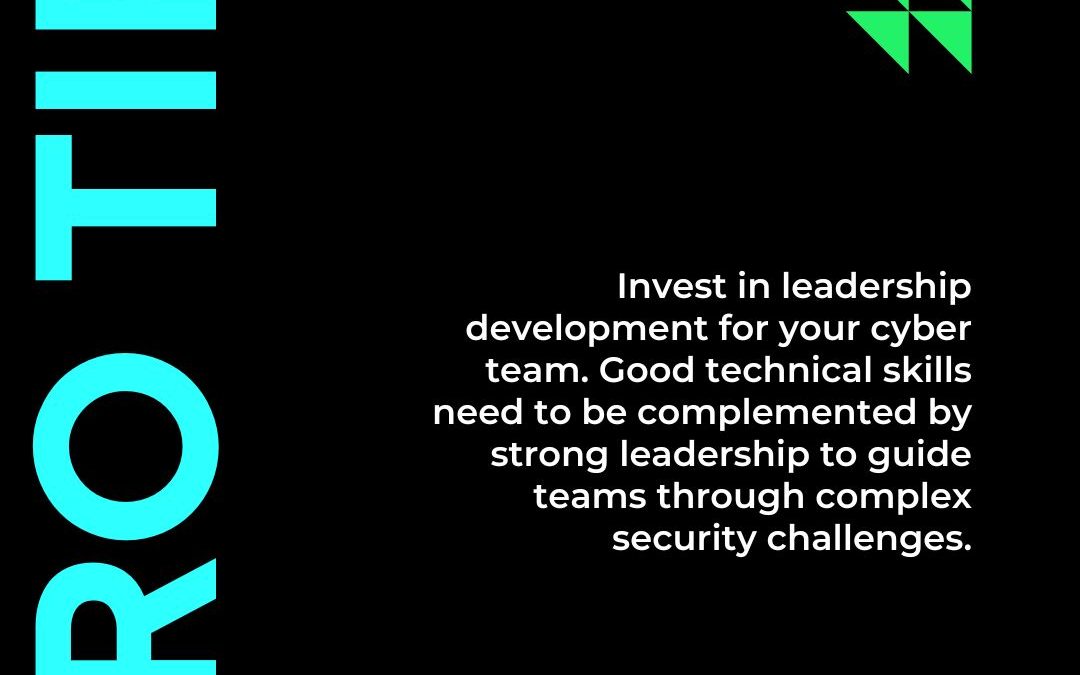In the world of cybersecurity, technical expertise is often seen as the most critical component for success. After all, professionals in this field need deep knowledge of tools, threats, and defensive techniques. But in the face of increasing complexity and ever-evolving cyber threats, strong leadership is just as important as technical know-how. Without it, even the most technically proficient teams can struggle to navigate security challenges effectively.
That’s why investing in leadership development for your cyber team should be a priority. It’s not just about preparing your organization to handle today’s security threats; it’s about creating the leaders who will guide your team through future challenges, inspire innovation, and foster a culture of continuous improvement.
Why Cyber Leadership Is More Important Than Ever
The cybersecurity landscape is marked by constant change—new technologies, emerging threats, and evolving regulatory requirements create an environment where teams need more than just reactive skills. Leaders in cybersecurity must be able to think strategically, make quick decisions under pressure, and effectively communicate with both their technical teams and senior management.
Here are a few key reasons why leadership development is essential in today’s cyber environment:
- Crisis Management and Decision-Making: When a cyber incident occurs, it’s not enough to have technical experts on hand. Effective leaders must be able to manage the situation calmly, make decisions quickly, and direct their team with confidence. Without strong leadership, teams may panic or hesitate, leading to delayed responses and potentially greater damage.
- Strategic Thinking: Good cyber leaders don’t just focus on day-to-day operations; they’re thinking about long-term strategies. This includes anticipating future threats, aligning cybersecurity goals with business objectives, and building resilient security programs that evolve with the organization’s needs.
- Team Motivation and Retention: Leadership isn’t just about managing threats—it’s also about managing people. Leaders play a crucial role in motivating their teams, fostering collaboration, and creating an environment where employees feel valued and supported. A strong leader can inspire loyalty, improve morale, and reduce turnover, all of which are critical for maintaining a high-functioning cyber team.
- Cross-Functional Communication: Cybersecurity doesn’t happen in a vacuum—it requires input and collaboration from other departments like IT, legal, HR, and senior leadership. Cyber leaders need the communication skills to bridge these gaps and ensure that cybersecurity efforts align with overall business goals.
What Makes a Strong Cyber Leader?
While technical proficiency is still an important trait for cyber leaders, the most effective leaders bring a diverse set of skills to the table. Here are some key qualities to look for and nurture in your cyber leadership team:
- Emotional Intelligence: Strong leaders understand how to manage their own emotions and those of their team, particularly in high-stress situations like security breaches. This emotional intelligence helps create a calmer, more productive work environment.
- Adaptability: In cybersecurity, change is constant. Whether it’s a new regulatory framework or an emerging type of attack, effective leaders can quickly adapt and guide their teams through uncharted territory.
- Vision and Innovation: Good leaders not only respond to current challenges but also look ahead. They are proactive in seeking out new tools, methodologies, and strategies that can give their teams an edge in the fight against cyber threats.
- Collaboration: Cyber leaders need to foster a collaborative environment where team members share knowledge and work together. They also need to collaborate effectively with other departments to ensure the organization’s overall success.
How to Invest in Leadership Development
Developing strong leaders within your cyber team doesn’t happen overnight, but there are specific steps you can take to foster leadership growth:
- Identify Potential Leaders Early: Keep an eye on team members who not only excel technically but also exhibit leadership qualities such as problem-solving, communication, and team-building. Offer them opportunities to take on more responsibility or manage small teams or projects.
- Offer Targeted Leadership Training: Leadership skills can be developed through training programs, workshops, and mentoring. Look for training opportunities that focus on areas like crisis management, communication, and strategic thinking. Pair emerging leaders with seasoned mentors to help them build these skills over time.
- Encourage Cross-Department Experience: Expose potential leaders to other parts of the organization. Understanding how different departments operate—and how cybersecurity interacts with them—can make leaders more effective at aligning security goals with business objectives.
- Create Opportunities for Leadership: Put your emerging leaders in real-world situations where they can apply their skills. This could be leading incident response efforts, managing a specific project, or even facilitating cross-functional security initiatives.
- Provide Ongoing Feedback and Support: Leadership development is an ongoing process. Offer continuous feedback, highlight strengths, and provide constructive insights on areas where they can improve. This helps to refine their leadership approach over time.
Closing Thoughts
In a field as dynamic and high-stakes as cybersecurity, good technical skills can only take your team so far. Strong leadership is essential to guide your team through complex security challenges, motivate them to stay engaged, and foster a culture of innovation and collaboration.
While leadership development may require time and effort, the payoff is a more resilient and effective team ready to tackle any challenges that come their way. Investing in leadership within your cyber team will not only strengthen your organization’s security posture but also ensure your team remains agile, motivated, and prepared for future threats.
If you’re looking to take your cyber workforce strategy to the next level, SkillRex is here to help. Whether you need job role analysis, skill baselining, or talent optimization, we’re dedicated to partnering with organizations to unlock their team’s full potential.


